Post-Investor Conference Notes: Of Access Holdings Plc YTD Results, Dividend, Share Capital and Performance
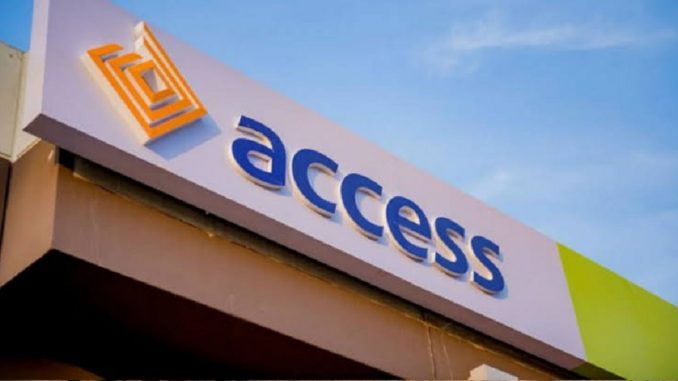
The Analyst Unit offers its thoughts on the investor conference held on Tuesday, November 04, 2025.
Fundamentals
Access Holdings Plc (ACCESSCORP) has been embroiled in a debate over its African expansion strategy. Two schools have influenced the banking group’s business direction and operational sustainability.
The first school has argued that the rapid expansion of banking operations across Africa on a brick-and-mortar framework has significantly increased the cost of its operations, weakened return on assets (ROA), and potentially reduced its equity returns, at least in the short term.
The second school argues that the brick-and-mortar expansion play by Access Bank would experience only short-term depression of financial fundamentals as the bank’s commercial playbook is a bold long-term aspirational play to enable the group diversify away from single economy credit risks, broaden deposit mobilization at lower average continental costs, and improve the quality of the group’s loan book through targeted premium risk assets in different continental markets. The narrative of this school aligns with the development of the African Continental Free Trade Area (AfCFTA) and the gradual activation of the Pan African Payment and Settlement System (PAPSS).
Indeed, Access Bank Group’s continental foray has come at a cost as the group recently shelved interim dividend payments. There has been a slight misunderstanding among some shareholders, who incorrectly attributed the non-payment of the group’s traditional interim dividend to the commitment of capital resources for continental expansion. The perception appears to be wrong.
At a recent Analysts Call meeting, the senior executives of the financial group noted that the non-payment of an interim dividend was due to the requirement to reconfigure its capital structure in line with regulatory guidelines. Hence, there is a need to pause dividend payouts.
According to the bank’s management, the Central Bank of Nigeria (CBN) noted in its regulatory guidance for a capital raise that the paid-up share capital of a financial holding group should exceed the sum of the paid-up share capital of its subsidiaries. Access Holding’s paid-up share capital was lower than the sum of the paid-up share capital of its subsidiaries, thereby requiring the regulator and the financial group to revisit the Holdco’s statement of financial position (balance sheet).
The review required that the group or Holdco remove the amounts associated with its share premium reserve from its total group share capital. Section 7.1 of the CBN’s Guidelines for Licensing and Regulation of Financial Holding Companies in Nigeria observes that ‘A financial holding company shall have a minimum paid up capital which shall exceed the sum of the minimum paid up capital of all its subsidiaries, as may be prescribed from time to time by the sector regulators (where the financial holding company owns 100 per cent of the subsidiaries).’
‘Where the financial holding company owns less than 100 per cent of the subsidiaries, its minimum paid-up capital shall exceed the summation of its proportionate holdings in the subsidiaries’. The delay in adjusting the group’s books to meet this regulatory requirement compelled the bank to defer dividend payment (see table 1 below).
Table 1:
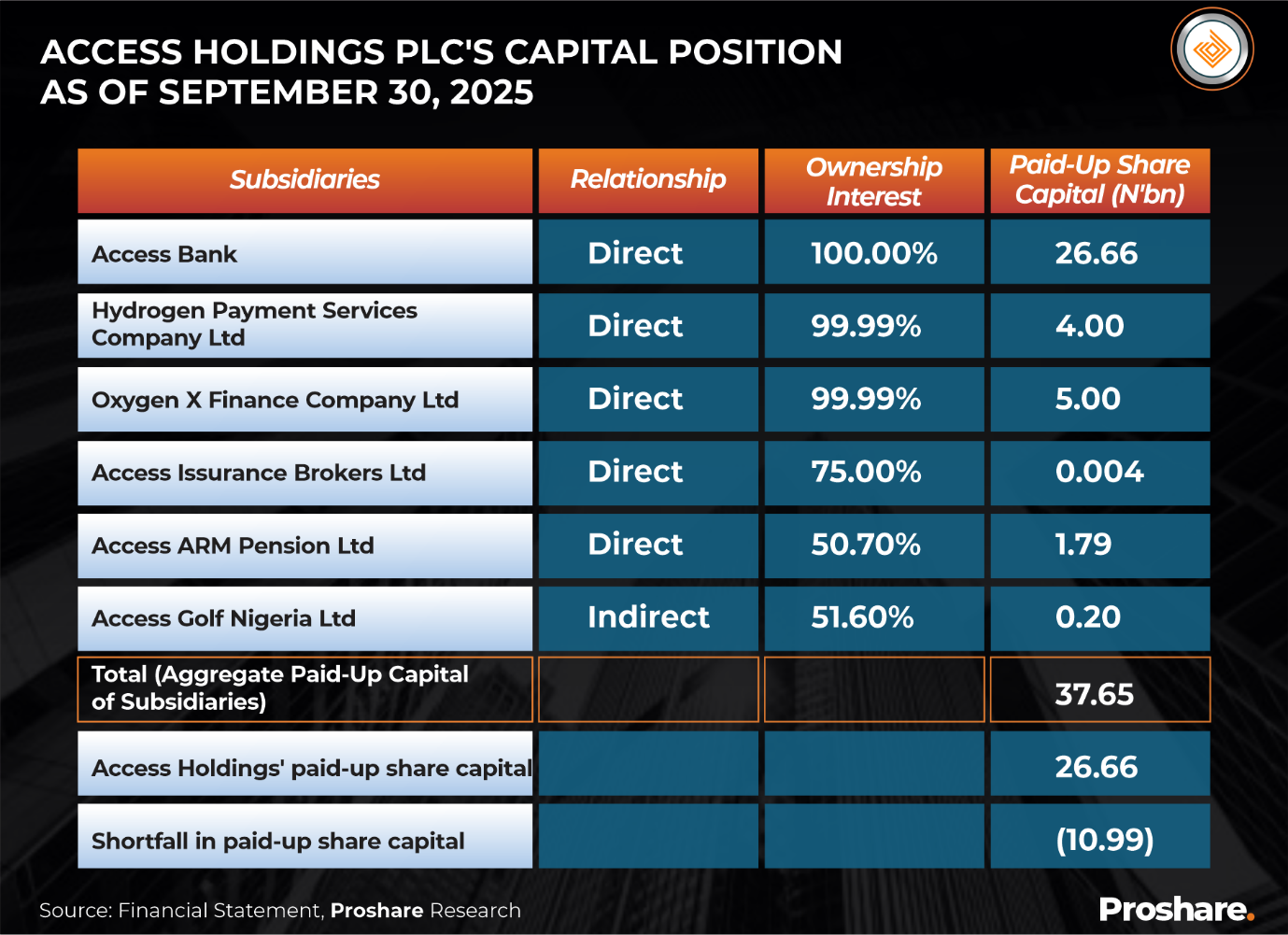
Key Highlights in 9M 2025
Access Holdings Plc sustained its earnings momentum in 9M 2025, consolidating its position as Nigeria’s largest financial services group by assets and earnings. The group recorded a +14.12% year-on-year (Y-o-Y) increase in gross revenue, rising from N3.42trn in 9M 2024 to N3.90trn in 9M 2025. This growth was driven by the resilience of the bank’s core banking income streams, as interest income rose by +21.10% to N2.90trn, reflecting improved asset yields and loan repricing amid elevated market rates. Fee-based income expanded, with net fees and commission income rising by +44.29%, supported by increased transaction volumes and digital adoption. Non-interest income dipped by -8.11% in 9M 2025 to N872.37bn from N948.86bn in 9M 2024, highlighting the bank’s improved treasury performance and diversified efforts.
AccessCorp’s net interest income increased by +48.90% year on year (Y-o-Y) to N1.26trn in 9M 2025 from N844.84bn in 9M 2024, reflecting improved funding efficiency and growth in interest-bearing assets. The modest +6.73% rise in operating expenses from N1.09trn in 9M 2024 to N1.16trn in 9M 2025 highlights ongoing cost management despite expansion pressures.
The group’s operating income rose by +18.77% to N2.13trn in 9M 2025 from N1.79trn in 9M 2024, surpassing cost growth. Profit before tax increased by +10.40% to N616.25bn, while profit after tax dropped by -2.23% to N447.55bn, due to a +141.46% rise in impairment charges to N349.99bn, indicating higher credit costs and conservative provisioning amid macroeconomic headwinds.
The financial position of AccessCorp maintained a robust profile, with year-on-year (Y-o-Y) total assets rising by +27.03% to N52.20trn in 9M 2025 from N41.09trn in 9M 2024, driven by growth in both loans and customer deposits. Customer deposits rose by +48.57% to N33.10trn in 9M 2025, indicating strong customer confidence and effective deposit mobilisation across the retail and corporate sectors. Loans and advances grew by +12.25% year-on-year (Y-o-Y) to N15.64trn, as the group cautiously expanded credit. Shareholders’ funds rose by +21.2% to N3.99trn in 9M 20205 from N3.30trn in 9M 2024, driven by retained earnings and improved capital buffers (See table 1 below).
Table 1:
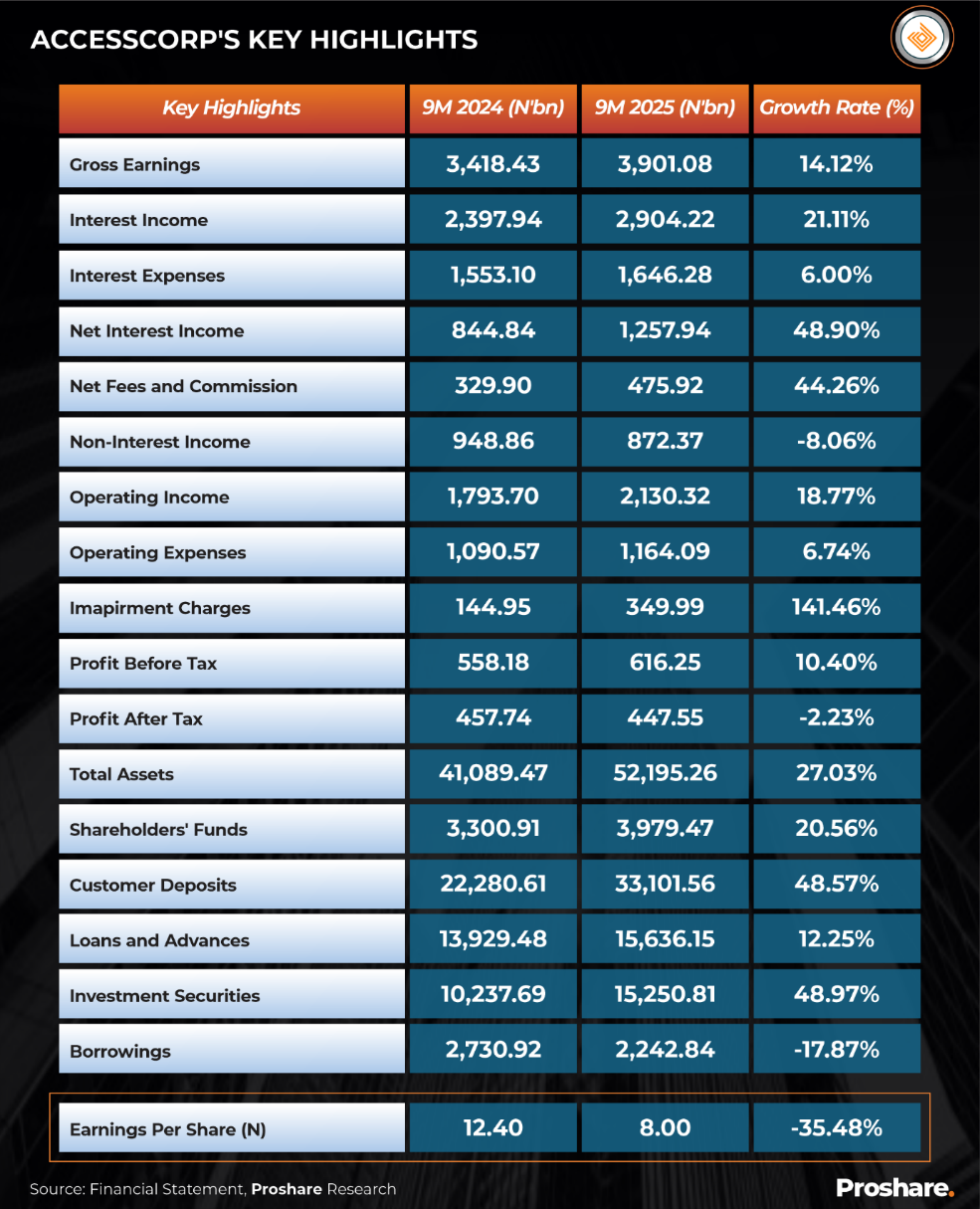
Key Ratios
Access Holdings demonstrated improvements in efficiency metrics, with the cost-to-income ratio dropping from 60.80% in 9M 2024 to 54.64% in 9M 2025, highlighting better operational leverage and cost control. The return on equity (ROE) declined from 22.20% in 9M 2024 to 15.40% 9M 2025, while return on assets (ROA) dipped to 1.30%. Additionally, the loan-to-deposit ratio decreased to 47.24% in 9M 2025 from 62.52% in 9M 2024, reflecting sufficient liquidity to support future credit growth and investment opportunities (see table 2 below).
Table 2:
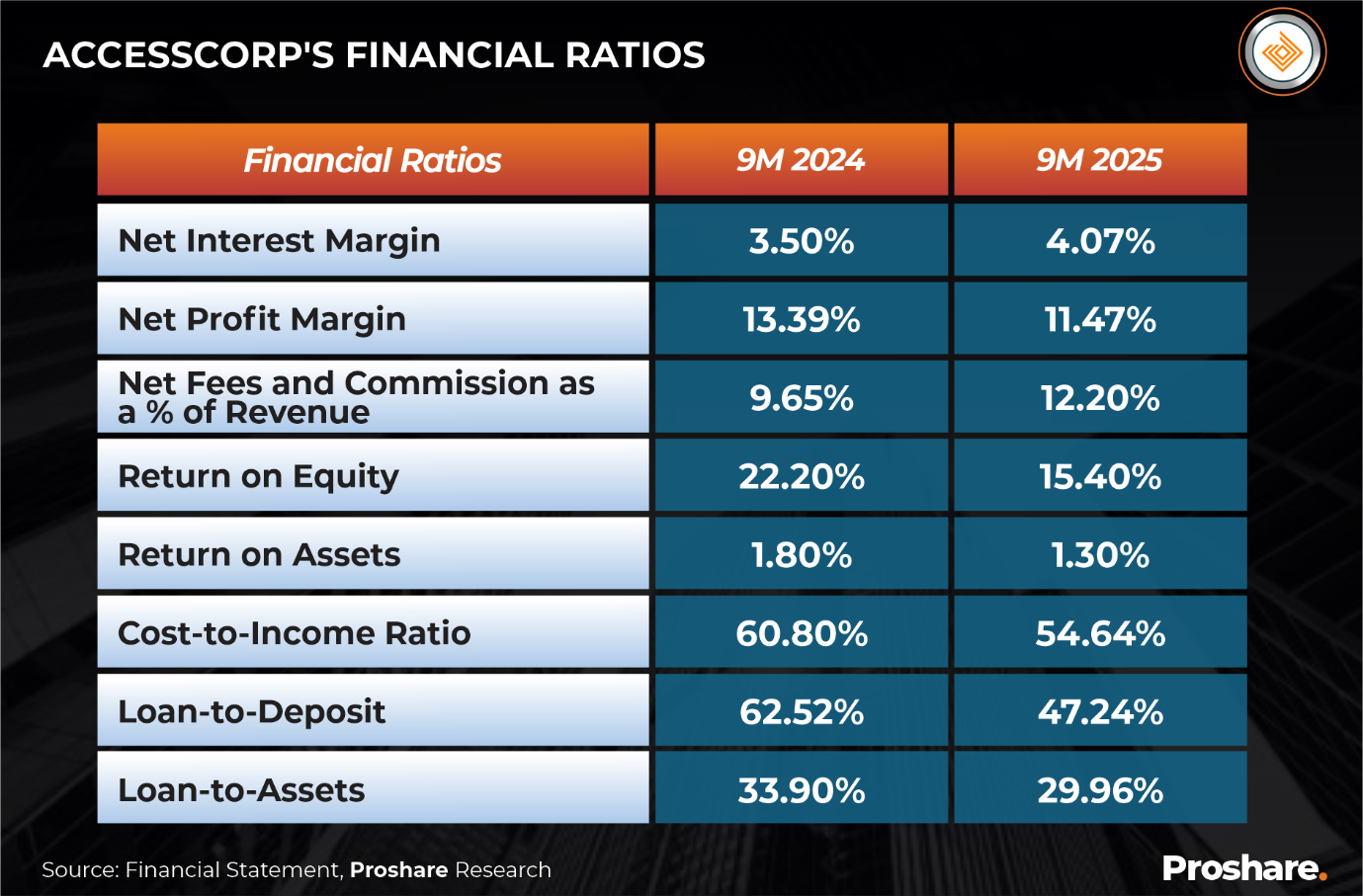
Valuation
The group’s price-to-earnings ratio rose to 3.21x in 9M 2025 (vs 1.66x in 9M 2024), reflecting more substantial earnings. The price-to-book ratio also grew to 0.34x from 0.33x, indicating improved alignment between market prices (See Table 3).
Table 3:
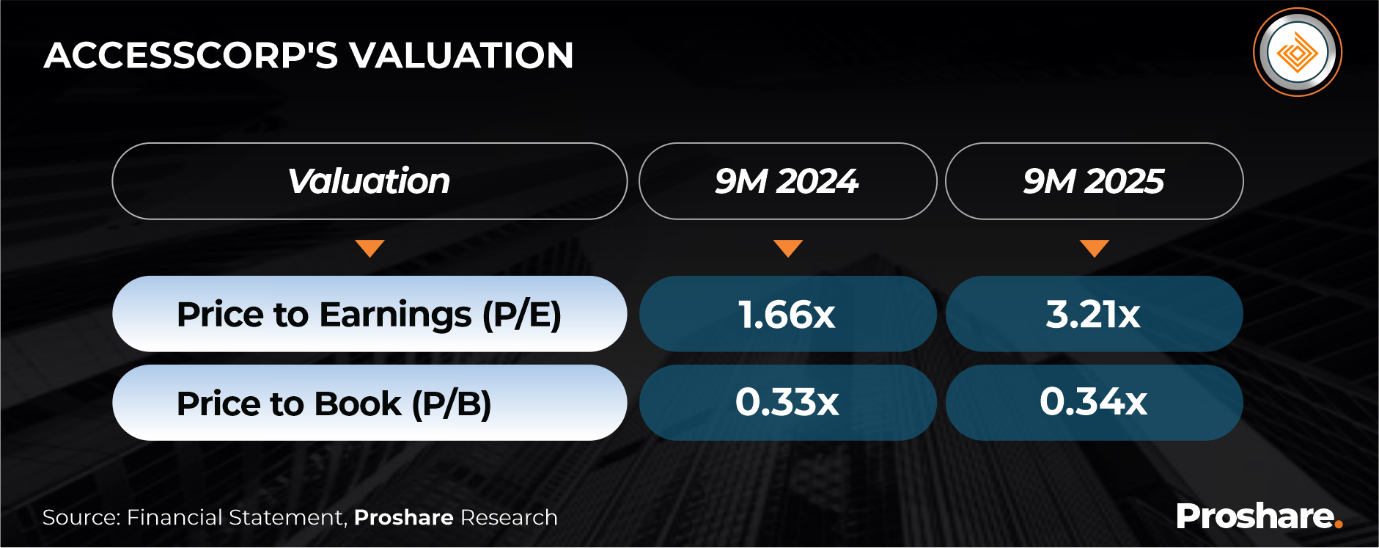
Share Price Movement
Access Holdings’ share price showed volatile movement from October 2024 to October 2025, fluctuating within a 52-week range of N20.05 to N28.50 per share, reflecting investor optimism and short-term profit-taking. Consolidating at N22.60 in October 2024, the stock saw a bullish rise in early 2025, reaching N28.50 in July 2025 amid improved investor sentiment following the group’s solid financial results.
Market corrections and sector-wide revaluations then led to the share price stabilising between N23 and N27 from March to September 2025. By early October 2025, the stock traded around N25 per share, indicating relative stability, supported by resilient fundamentals and sustained investor confidence (see chart 1 below).
Chart 1:

Opinion
Access Holdings Plc remains well-positioned to sustain earnings growth in the final quarter of 2025, supported by its diversified income streams, strong liquidity, and expanding retail franchise. The group’s strategic focus on digital innovation, regional expansion, and non-banking ventures continues to provide resilience against market volatility. However, rising impairment charges and macroeconomic headwinds such as inflationary pressures, FX volatility, and elevated interest rates may constrain near-term profitability growth.
Overall, Access Holdings’ 9M 2025 performance reaffirms its position as one of Nigeria’s largest and most systemically important financial institutions, with solid balance sheet growth, improved efficiency, and enhanced shareholder returns. The improvement in ROE and cost efficiency, alongside a strong funding base, provides a positive outlook heading into FY2025, suggesting that Access Holdings remains on track to deliver sustained long-term value creation despite near-term margin pressures




